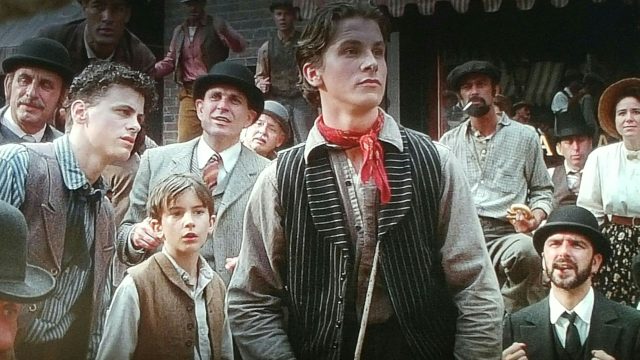This is extremely loosely based on real events. The real-life leader of the strike, the one-eyed Kid Blink, is a character in this, played by Trey Parker Not That Trey Parker. It is also true that 1899 was an era that relied on child labor to an extent it’s hard to picture today. The city of New York had children in enormous numbers of industries. In the days before coin-operated boxes on every corner and established newsstands, much less the ubiquity of other news sources, the main method of selling newspapers was children, many of whom would be on the streets until well after midnight, because their papers would not be bought back if they didn’t sell them, and they would end up at a loss after the whole day.
Jack Kelly (Oscar winner-to-be Christian Bale) is one of hundreds, probably, of boys selling newspapers on the streets of New York. Manhattan, in his case. He’s the leader of them, and he takes David (David Moscow) and Les (Luke Edwards) Jacobs under his wing. Then one day, in an attempt to make more money, Joseph Pulitzer (Robert Duvall) raises the price of newspapers for the newsies from fifty cents per hundred—meaning each boy makes a profit of half a cent a paper—to sixty cents per hundred. The newsies go on strike, because they can barely make a living now. Most of them are on their own in one way or another, though David and Les have a family.
Even in today’s money, these are literal children trying to make it on ten to twenty dollars a day. David and Les are trying to support a family; their father is injured and cannot work in the factory. The boys and their sister are working to keep the family together; after all, there’s no workman’s compensation available, either. The children learn both the power of the union and what the men in power will do to break the union. Maybe this movie ought to be required viewing for all those people crossing picket lines at Starbucks.
It’s frustrating how meh this movie is. The dancing is awkward and anachronistic. The acting’s fine—my Gods would I have been all over Spot Conlon (Gabriel Damon) if I’d actually seen this new—but with the exception of Max Casella as the historical Racetrack Higgins, the accents are terrible. Gods love him, Christian Bale gives us trying about half the time while he’s singing, because he can manage one at a time. King of New York he may be; king of New York accents he is not. He’s acting his eighteen-year-old heart out, and I admire him for it, but the movie never gels.
I wonder if part of the problem was that Alan Menken was feeling the loss of Howard Ashman at the time. This was supposed to be an Ashman-Menken production, but Ashman was too sick to work on it. You feel for Alan Menken, but it doesn’t make the songs better. As for the dancing, it’s attempting to be 1899 but also 1992, and therefore it of course fails at both. It also never feels as though it’s earning its enormous production numbers. They’re a staple in the genre, but this movie is trying to have it both ways by giving us an enormous production number full of characters that we’ve gotten to know that also feel like the kind of impersonal enormous production number where everyone dancing is, like, mailmen and random nursemaids and so forth.
It’s a powerful story that’s failed by its actual production. Which is a shame. It wastes its talented young cast. (And such lights as Bill Pullman as a sympathetic reporter and Ann-Margret as a sympathetic burlesque star.) It wastes Alan Menken. It wastes the Fenyes Mansion, the Pasadena, California, landmark that stands in for the Pulitzer mansion—not long after this movie came out, I was a junior docent in that very building and learned that the room they were teaching us all this in was the room where Pulitzer blackmails Jack. Granted, I was studying to be child labor at the time, but we were volunteers in theory Learning Valuable Lessons.
All things considered, a one-dollar monthly subscription to my Patreon isn’t that much than the cost of an 1899 newspaper in modern money; contributions to my Ko-fi are appreciated, too!

